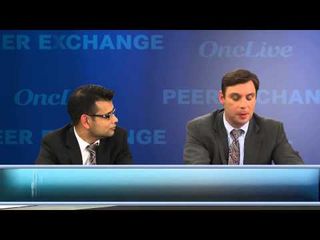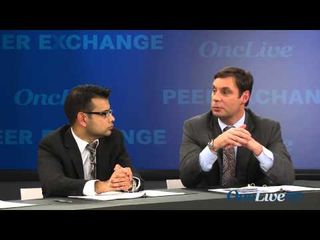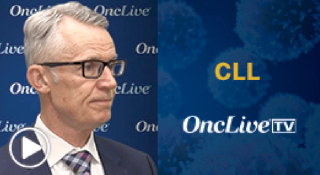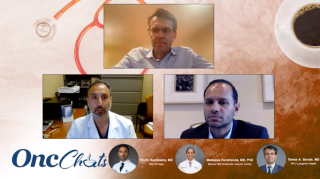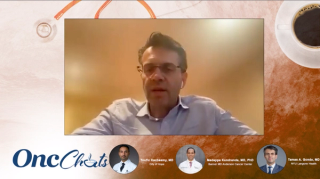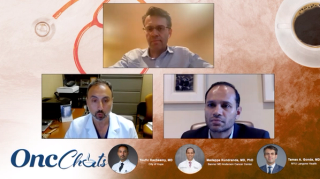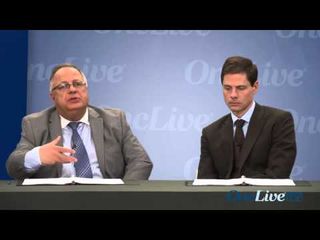
Precision Medicine in Oncology®
Latest News
Video Series

Latest Videos
CME Content
More News

Olomorasib plus pembrolizumab demonstrated responses in first-line metastatic KRAS G12C–mutant non–small cell lung cancer.

Fred R. Hirsch, MD, PhD, discusses the role of molecular testing in non–small cell lung cancer.

The Guardant Reveal test was accurate in predicting disease recurrence in stage II or higher colorectal cancer.

The FDA cleared the SeCore CDx HLA A Sequencing System as a companion diagnostic for afamitresgene autoleucel in advanced synovial sarcoma.

The FDA has granted de novo marketing authorization to the PGDx elio plasma focus Dx pan–solid tumor liquid biopsy test.

A panel of oncologists engage in a case-based discussion of patients with locally advanced disease at the 25th Annual International Lung Cancer Congress.

Jonathan W. Riess, MD, MS, and James Chih-Hsin Yang MD, PhD, debate the benefits of upfront osimertinib with/without chemotherapy in EGFR-mutant NSCLC.

Justin M. Watts, MD, discusses 5-year efficacy and safety data for olutasidenib in IDH1-mutant, relapsed/refractory AML.

The FDA has granted fast track designation to CT-0525 for the treatment of patients with HER2-overexpressing solid tumors.

Recent studies of novel mTOR inhibitors in combination with various agents have shown how these combinations may be used for patients with solid tumors.

Here is your guide to the important regulatory decisions made by the FDA in June 2024.
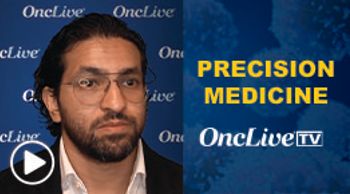
Salman R. Punekar, MD discusses the rationale for evaluating safety and preliminary anti-tumor activity of NT-112 in solid tumors with the KRAS G12D mutation.

The FDA has approved a companion diagnostic for niraparib plus abiraterone acetate in BRCA-mutated metastatic castration-resistant prostate cancer.

In case you missed any, below is a recap of every OncLive On Air episode that aired in June 2024.

Aparna Parikh, MD, discusses key findings from the HERKULES-3 study and what the future of the BRAF-mutated mCRC treatment paradigm may look like.

The EMA's CHMP has adopted a positive opinion regarding erdafitinib in patients with FGFR3+ unresectable or metastatic urothelial carcinoma.

Lunresertib plus FOLFIRI was safe and produced responses in advanced gastrointestinal tumors harboring CCNE1 amplifications or FBXW7 alterations.

A panel of expert clinicians discuss the treatment landscape of HER2-mutant non–small cell lung cancer, highlighting the current roles of ADCs and TKIs, and unmet needs that remain in the space.

Edward B. Garon, MD, MS, takes stock of the non–small cell lung cancer field in light of recent updates from clinical trials.

Lauren E. Nye, MD, highlights reasons to look beyond CDK4/6 inhibitors when determining treatments for patients with hormone receptor–positive advanced breast cancer and more.
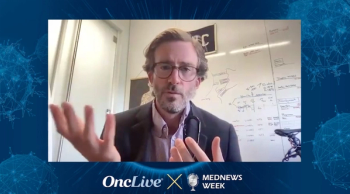
Thomas Marron, MD, PhD, of The Tisch Cancer Institute at Mount Sinai, discusses the ways cancer attacks the bone marrow and immune system.

A BLA is seeking the approval of subcutaneous amivantamab for all currently approved indications of the IV formulation in EGFR+ NSCLC.

The FDA granted accelerated approval to repotrectinib (Augtyro) for select patients with solid tumors harboring a NTRK gene fusion.

The FDA granted full approval to selpercatinib for select patients with advanced or metastatic RET fusion–positive thyroid cancer.

The European Commission has approved alectinib for adjuvant use in adult patients with ALK+ non–small cell lung cancer at high risk of recurrence.










